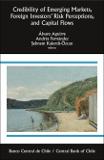| dc.contributor.editor | Aguirre R., Álvaro | |
| dc.contributor.editor | Fernández, Andrés | |
| dc.contributor.editor | Kalemli-Ozcan, Sebnem | |
| dc.date.accessioned | 2023-08-03T18:17:58Z | |
| dc.date.available | 2023-08-03T18:17:58Z | |
| dc.date.issued | 2023-08-09 | |
| dc.identifier.isbn | 9789567421718 | |
| dc.identifier.isbn | 9789567421725 (digital) | |
| dc.identifier.issn | 0717-6686 (Series on Central Banking, Analysis, and Economic Policies) | |
| dc.identifier.uri | https://hdl.handle.net/20.500.12580/7502 | |
| dc.description | Emerging market economies (EMEs) are constantly exposed to shocks that originate in world capital markets, posing serious challenges to policymakers. By dealing with these shocks —Covid-19 representing the most recent event— several lessons have been learned in terms of the ways they
propagate as well as the various tradeoffs of policy responses available. Credibility and foreign investors’ risk perceptions are central when analyzing these episodes, and they are closely associated with the design of monetary and fiscal frameworks, as well as the conduct of unconventional
policies. This volume contributes to the study of these issues by focusing on the understanding of the array of challenges
and policy options for EMEs’ policymakers for short-run stabilization purposes as well as longer-term issues that should be on their radars, bringing together a multinational
group of distinguished scholars to discuss the latest research findings. | |
| dc.description.abstract | Emerging market economies (EMEs) are constantly exposed to shocks that originate in world capital markets, posing serious challenges to policymakers. By dealing with these shocks —Covid-19 representing the most recent event— several lessons have been learned in terms of the ways they
propagate as well as the various tradeoffs of policy responses available. Credibility and foreign investors’ risk perceptions are central when analyzing these episodes, and they are closely associated with the design of monetary and fiscal frameworks, as well as the conduct of unconventional
policies. This volume contributes to the study of these issues by focusing on the understanding of the array of challenges
and policy options for EMEs’ policymakers for short-run stabilization purposes as well as longer-term issues that should be on their radars, bringing together a multinational
group of distinguished scholars to discuss the latest research findings. | |
| dc.description.tableofcontents | Credibility of Emerging Markets, Foreign Investors’ Risk
Perceptions, and Capital Flows: An Overview / Álvaro Aguirre, Andrés Fernández, and S ebnem Kalemli-Özcan --
The International Financial System after Covid-19 / Maurice Obstfeld -- Exchange Rate Puzzles and Policies / Oleg Itskhoki and Dmitry Mukhin -- International Risk Spillovers: Implications for Emerging Markets’ Monetary Policy Frameworks with an Application to Chile / Sebnem Kalemli-Özcan -- Global Drivers and Macroeconomic Volatility in EMEs: A Dynamic-Factor, General- Equilibrium Perspective
/ Gent Bajraj, Andrés Fernández, Miguel Fuentes, Benjamin García, Jorge Lorca, Manuel Paillacar, and Juan M. Wlasiuk --
Sovereign-Debt Crises and Floating-Rate Bonds / Mark Aguiar, Manuel Amador, and Ricardo Alves Monteiro -- KFstar and Portfolio Inflows: A Focus on Latin America / John D. Burger, Francis E. Warnock, and Veronica Cacdac Warnock --
How Important Is The Commodity Supercycle? / Andrés Fernández, Stephanie Schmitt- Grohé, and Martín Uribe --
Cross-Border Corporate Control: Openness and Tax Havens /
Gur Aminadav, Luís Fonseca, and Elias Papaioannou --
The Reversal Problem: Development Going Backwards /
Eduardo Olaberria and Carmen M. Reinhart. | |
| dc.format | .pdf | |
| dc.format.extent | Documento Completo | |
| dc.format.medium | 313 páginas. | |
| dc.language.iso | en | es |
| dc.publisher | Banco Central de Chile | es |
| dc.rights | Attribution-NonCommercial-NoDerivs 3.0 Chile | * |
| dc.rights.uri | http://creativecommons.org/licenses/by-nc-nd/3.0/cl/ | * |
| dc.title | Credibility of emerging markets, foreign investors’ risk perceptions, and capital flows | es |
| dc.type.doc | Libro | |
| dc.placeofedition | Santiago, Chile | |


